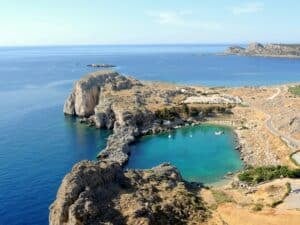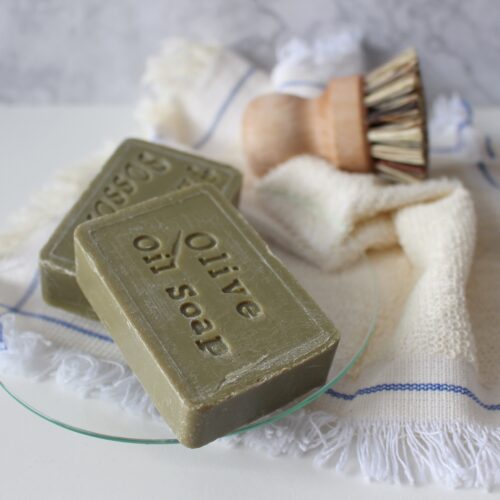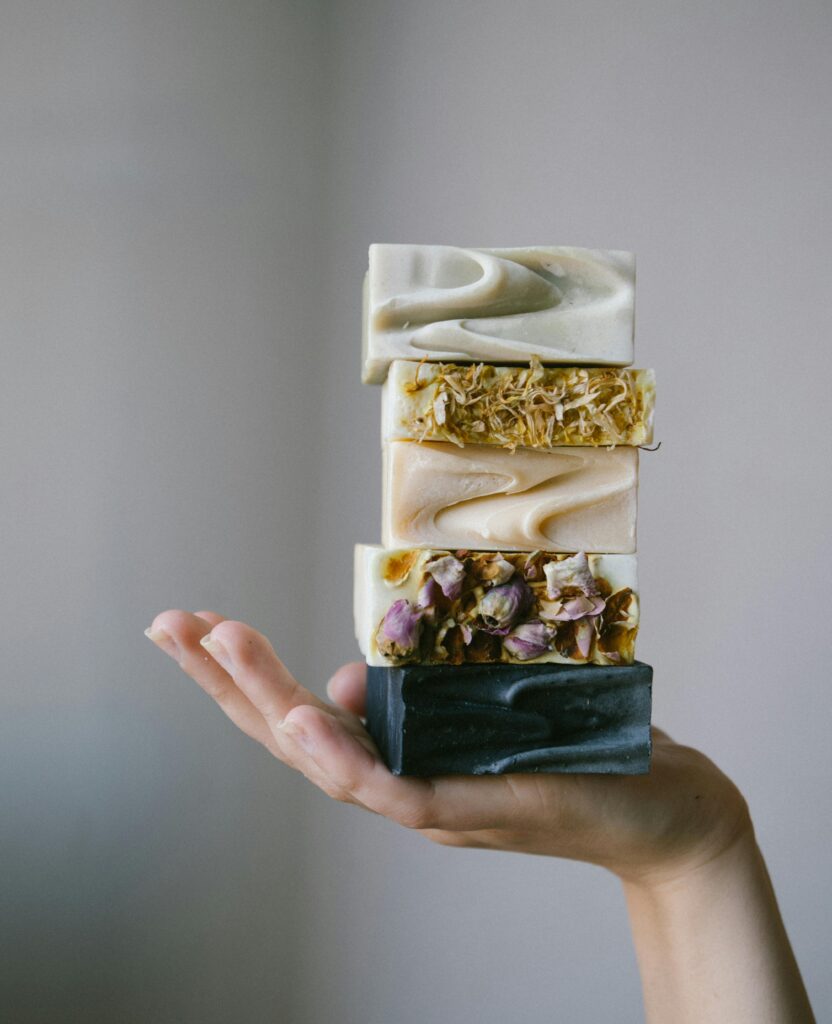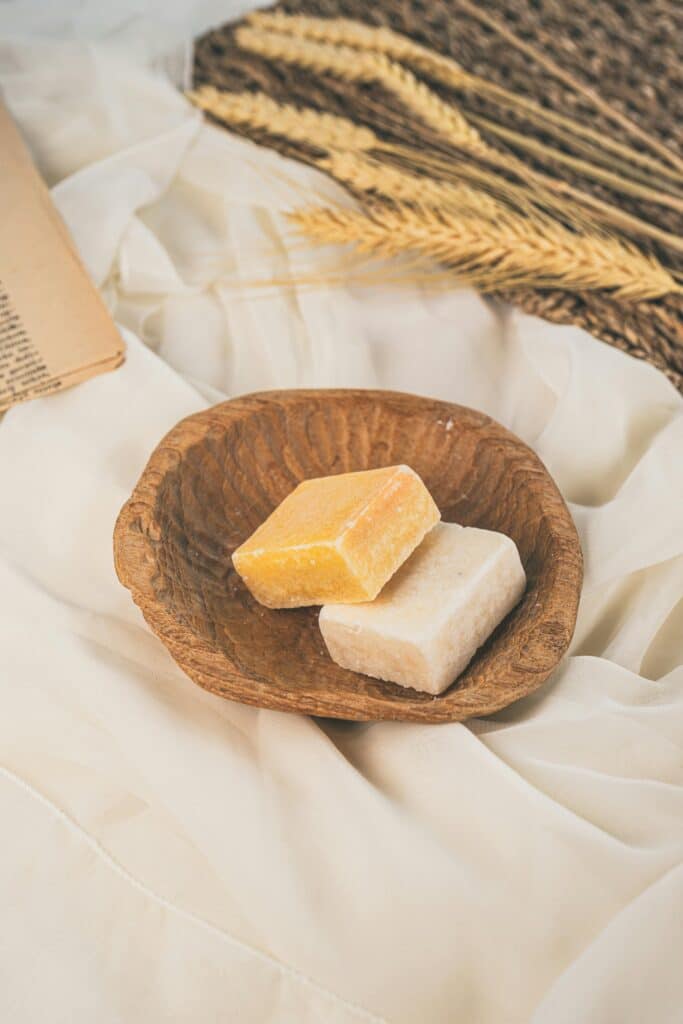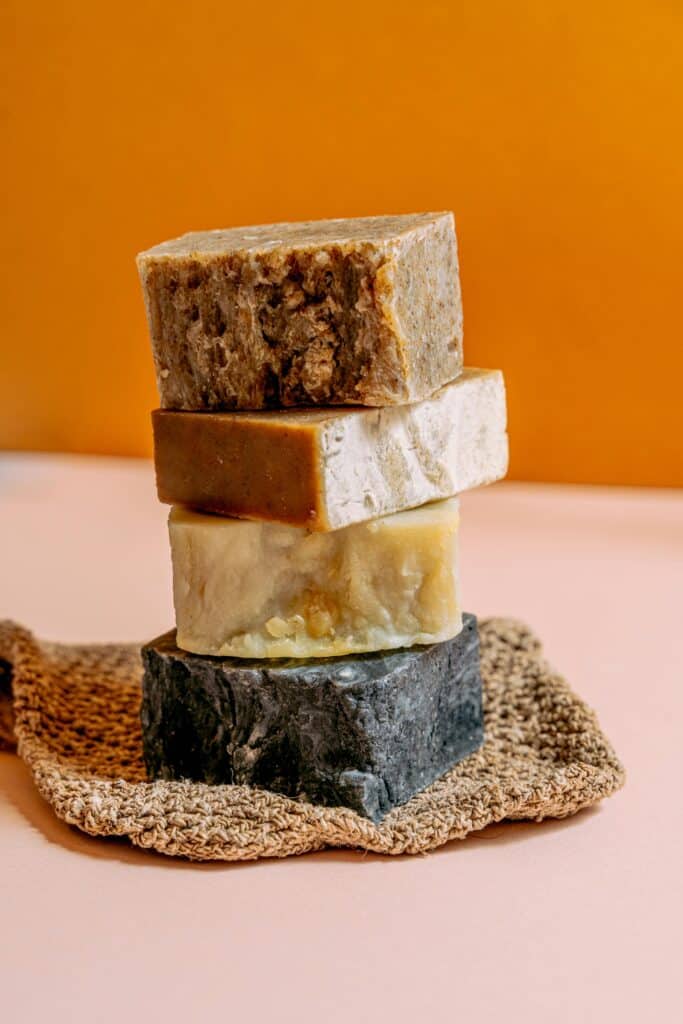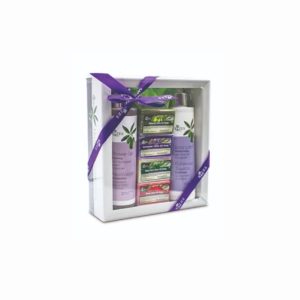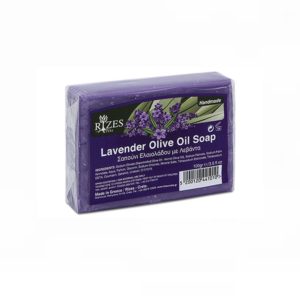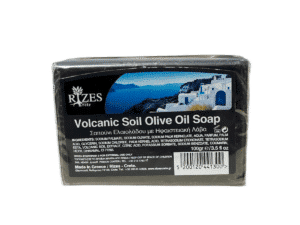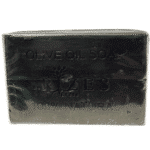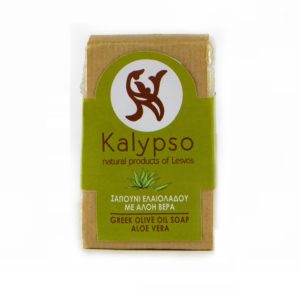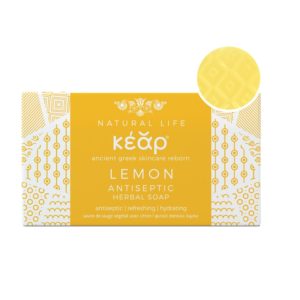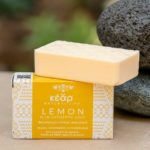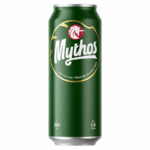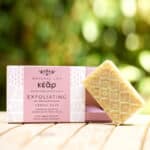L'Artisanat du Savon Grec: Pure care and respect for the skin
Greek soap, particularly olive oil soap, symbolizes Mediterranean craftsmanship and age-old traditions. Used since ancient times, this product combines nourishing properties with respect for the environment. Known for its exceptional benefits for the skin, it seduces with its simplicity and authenticity. Made from natural ingredients, Greek soap is a body care essential, offering a unique experience of softness and well-being.
The historical origins of soap in Greece
The history of soap in Greece dates back to antiquity. In those days, it played an essential role in hygiene and religious practices. The Greeks used natural oils, mainly olive oil, and ashes to make rudimentary soaps. These soaps were used to cleanse skin and hair, made from locally available resources.
Olive oil, revered for its benefits to the skin, quickly became the key ingredient in soap production. Its soft texture and moisturizing properties have made olive oil a central element in the manufacture of Greek soap. This product was not only used for skin care, but also in purification rituals. Before religious ceremonies or entering public baths, the Greeks purified themselves with soap to prepare themselves spiritually.
From the 8th century onwards, the cold saponification technique was developed. It preserves the beneficial properties of olive oil while producing a softer, more effective soap. Regions such as Crete and Corfu have specialized in handmade soap production, perpetuating a unique know-how down the generations.
Today, craftsmen continue to use these traditional techniques to produce quality soap, a symbol of Greek cultural heritage.
Olive Oil Soap: A Natural Beauty Elixir
Greek soap with olive oil is prized for its exceptional benefits for the skin. It is distinguished by its moisturizing and antioxidant properties, thanks to olive oil’s rich content of vitamins A and E. These vitamins help to deeply nourish the skin, protecting it from premature aging and promoting cell regeneration.
Unlike industrial soaps, this soap contains no harsh substances or chemicals. It remains a gentle, natural choice for even the most sensitive skin. Olive oil effectively moisturizes without disturbing the natural balance of the epidermis, keeping skin supple and radiant.
Regular use leaves skin soothed and protected, while respecting its specific needs. Olive oil soap doesn’t just clean; it also nourishes, reducing dryness and common irritations.
What’s more, the soap’s delicate aroma comes from the essential oils in its composition. These aromas add a pleasant touch while reinforcing the benefits for the skin. So this soap is much more than just a skincare product: it offers a complete, natural sensory experience.
Handcrafted products: know-how inherited from our ancestors
Greek soap-making is based on traditional methods handed down from generation to generation. These techniques respect the purity of natural ingredients and guarantee a quality product.
Cold Saponification: preserving nutrients
The cold saponification method is essential to preserve the nourishing properties of the olive oil and other ingredients. This gentle technique maintains the oil’s rich vitamin and mineral content, ensuring a moisturizing, skin-friendly soap. Unlike industrial methods, which can alter the properties of oils, cold saponification creates a more natural and effective product.
Using Olive Oil and Natural Herbs
Olive oil is slowly heated and then mixed with soda ash, initiating saponification. Herbs such as lavender, rosemary or chamomile can then be added. They offer antioxidant and soothing properties. These plants enrich the soap and give it a subtle fragrance.
Maturation and cutting processes
After preparation, the soap is left to rest for several weeks, a crucial process that allows the ingredients to stabilize and harmonize. This resting time gives the soap its perfect consistency. The soap blocks are then cut by hand, each piece carefully packaged to guarantee its quality.
A product that respects the skin and the environment
This artisanal process not only ensures optimum quality, but also an environmentally-friendly approach. Traditional techniques, using local, sustainable resources, enable us to create a soap that respects both skin and nature. It’s this attention to detail and respect for ancestral practices that makes Greek soap unique and sought-after.
Greek soap remains a precious product, appreciated for its virtues and its traditional craftsmanship.
The Different Varieties of Greek Soap: From Olive Oil to Aromatic Herbs
In Greece, soaps come in many different versions, each tailored to specific needs and drawing on the benefits of local natural resources.
Pure Olive Oil Soap: the timeless classic
Pure olive oil soap remains the most popular and traditional. It is appreciated for its moisturizing and soothing properties, thanks to the richness of olive oil in vitamins A and E. This mild, natural soap is ideal for sensitive skin and daily care. It deeply moisturizes the skin, leaving it soft and nourished.
Soap Enriched with Local Herbs: Thyme, Mint and Others
Greek soap is also distinguished by variants enriched with local herbs. Thyme and mint are particularly popular plants, known for their antiseptic and soothing properties. These herbs not only add a pleasant fragrance, but also provide therapeutic benefits for the skin. They are ideal for skin prone to imperfections or for a refreshing effect.
Laurel Oil Soap: For Purified Skin
Some Greek producers enrich their soaps with laurel oil, beneficial for blemish-prone skin. Laurel oil has been used since ancient times to purify and cleanse the skin. It has antibacterial and antifungal properties, making it an ideal choice for oily or acne-prone skin. This purifying soap helps restore skin balance and radiance.
Sweet Almond Oil Soap: For Moisturized Skin
Sweet almond oil soap is a perfect choice for dry or sensitive skin. This nourishing oil is rich in essential fatty acids, making it an excellent moisturizer. It helps restore the cutaneous barrier while soothing the skin. This soap is often used for face and body care, especially in winter, when the skin needs extra moisture.
A Choice for Every Skin Type
Each variety of Greek soap reflects the natural abundance of Greece. Whether for its purifying, moisturizing or soothing properties, Greek soap offers solutions for every skin type, using local, natural ingredients.
The benefits of Greek Soap for the skin and the environment
Nourishing and moisturizing properties
Greek soap, especially olive oil soap, is renowned for its powerful nourishing properties. Rich in essential fatty acids, it deeply nourishes the skin without drying it out, unlike some commercial soaps. This natural hydration helps preserve skin elasticity and prevent premature aging.
Antioxidant properties
Greek soap contains antioxidants like vitamin E and olive oil polyphenols, which help fight free radicals. These properties are particularly beneficial in protecting the skin from external aggressors, such as pollution or the effects of the sun.
A Healthy Choice for Sensitive Skin
The absence of chemicals in Greek soap makes it suitable for all skin types, including sensitive or reactive skin. It soothes and reduces redness and irritation, yet is gentle enough for everyday use.
Respect for the environment
Handcrafted Greek soap is entirely biodegradable, making it environmentally friendly. Made with natural ingredients and without harmful chemicals, it has a low ecological impact compared to industrial products. Artisanal, often local, manufacturing methods reduce carbon footprints and support local economies. By using these soaps, we support an eco-responsible approach.
Support for sustainable practices
Greek soaps are produced with respect for the environment, using local, sustainable ingredients. For example, olive oil comes from local crops, often organic, which guarantees nature-friendly farming practices. This support for sustainable agriculture helps preserve the Greek landscape and local biodiversity.
No Harmful Additives
Handcrafted Greek soap contains no parabens, sulfates or other chemicals commonly used in industrial soaps. This makes it a natural and healthy choice for people concerned about their well-being and the quality of the products they use on their skin.
Famous Regions for Soap Production in Greece
Soap production in Greece is distinguished by the diversity and quality of regional know-how. Certain regions are particularly renowned for their expertise, which contributes to the export of high-quality Greek soap around the world.
Crete: the island at the heart of traditional soapmaking
Crete, the birthplace of olive oil, is undoubtedly the most famous soap-making region in Greece. The island boasts extensive olive groves, which provide the essential oil for the production of high-quality handmade soaps. Cretan soaps, made from pure olive oil, are famous for their gentle, moisturizing and nourishing properties. The cold saponification method is often used here, preserving the benefits of the oil and guaranteeing a natural, skin-friendly product.
Corfu: A deep-rooted craft tradition
The island of Corfu, located in the Ionian Sea, is also an important center for soap production. Corfu artisans have been making soap for centuries, often using local herbs such as lavender and rosemary, which add soothing and antiseptic properties. The traditional manufacturing technique, handed down from generation to generation, has made Corfu one of Greece’s leading soap-making centers.
Lesvos : Soap of Tradition and Quality
The island of Lesvos, renowned for its olive oil and aromatic herbs, is also a major producer of soap in Greece. Lesvos artisans often enrich their soaps with local plants, such as laurel oil, used for its purifying and regenerating properties. This soap is prized for its benefits on the skin, particularly for oily, blemish-prone skin.
Athens and the Peloponnese: the revival of artisanal soap factories
In Athens and the Peloponnese, small family soap factories perpetuate the Greek soap tradition. These workshops continue to produce soaps from natural ingredients such as olive oil and local medicinal plants. Although less well known than the major soap-producing regions, these artisan soap factories play a key role in preserving traditional manufacturing methods and promoting Greek soap on international markets.
The Evolution of Greek Soap through the Ages
Greek soap has stood the test of time, evolving with the times while retaining its fundamental principles. While early versions were mainly functional, focusing on hygiene and purification, modern soaps have become refined care products, combining tradition and innovation.
The First Greek Soaps: Functional Products
In ancient times, Greek soap was mainly made from simple ingredients such as olive oil and vegetable ash. Used in public baths and religious rituals, soap was primarily a cleaning product. Olive oil, already revered for its benefits to the skin, was the basic ingredient, while ashes added an abrasive effect to exfoliate the skin.
Medieval soaps: a popular but simple product
In the Middle Ages, soap-making techniques in Greece were perfected with the introduction of new saponification methods. Although always based on olive oil, these soaps often included local herbs and flowers to enhance their antiseptic and fragrant properties. Families and monasteries used these soaps, and their production was mainly artisanal.
The Modern Era: Diversification and Innovation
In the 20th century, soap production in Greece diversified considerably. Artisans began to add additional natural ingredients such as honey, aloe vera, lavender and other essential oils. These ingredients enrich the soap’s properties, offering moisturizing, soothing and regenerating benefits. Modern Greek soaps are now available in a wide range of fragrances and textures, while remaining rooted in the olive oil tradition.
The Essence of Greek Soap Today: Tradition and Innovation
Although the range of Greek soaps has evolved to include many different fragrances and textures, the essence of the soap remains unchanged: the use of pure olive oil, a natural ingredient rich in antioxidants and beneficial to the skin. Today, Greek craftsmen continue to combine traditional know-how with innovation, producing soaps that combine therapeutic and cosmetic properties with modern formulations adapted to contemporary needs.
How to Choose a Quality Greek Soap
To choose an authentic Greek soap, opt for those with a high olive oil content and no chemical additives. Green or beige color and a slightly irregular texture are indicators of quality. The scent should be subtle and natural, reflecting the ingredients used rather than artificial fragrances. A good Greek soap combines simplicity, efficiency and respect for traditional craftsmanship.
Greek Soap Worldwide: A Product Exported and Appreciated Internationally
- An internationally popular product
Greek soap is an international success story. More and more people appreciate its quality, benefits and eco-friendliness. It is gradually gaining a foothold in many countries, notably in Europe, North America and other regions.
- The Authenticity and Modernity of Greek Soapworks
Greek soapmakers succeed in combining tradition and innovation. They use traditional artisan methods such as cold saponification, while enriching their creations with local ingredients such as honey, aloe vera and essential oils, meeting the expectations of customers looking for authentic, effective products.
Greek soap exports have grown strongly in recent years. Consumers looking for natural cosmetics, as well as the ecotourism craze, have boosted demand for soaps made in an environmentally-friendly way.
- A Symbol of Quality and Durability
Greek soap symbolizes consumers’ attachment to sustainable, natural products. By offering skin care products free from harsh chemicals, it perfectly meets the growing demand for cosmetics that respect the environment and our health.
A Wellness Ritual Inspired by Greece
Using a Greek soap is much more than a simple care gesture. Each soap embodies the history of Greek olive groves and the know-how handed down through generations. Its hand-crafted production transforms the daily routine into a moment of pleasure, bringing softness and natural benefits to the skin.
Whether for a relaxing bath or a daily routine, Greek soap nourishes and moisturizes the skin thanks to its pure ingredients, such as olive oil. These soaps leave skin soft, radiant and deeply nourished, while providing a feeling of well-being and serenity.
By choosing a Greek soap, you’re opting for a product that respects the environment. Made without chemicals, this soap is biodegradable and supports a traditional production method. It’s a simple, pure beauty ritual that respects both our bodies and the planet.
Our Greek soaps
